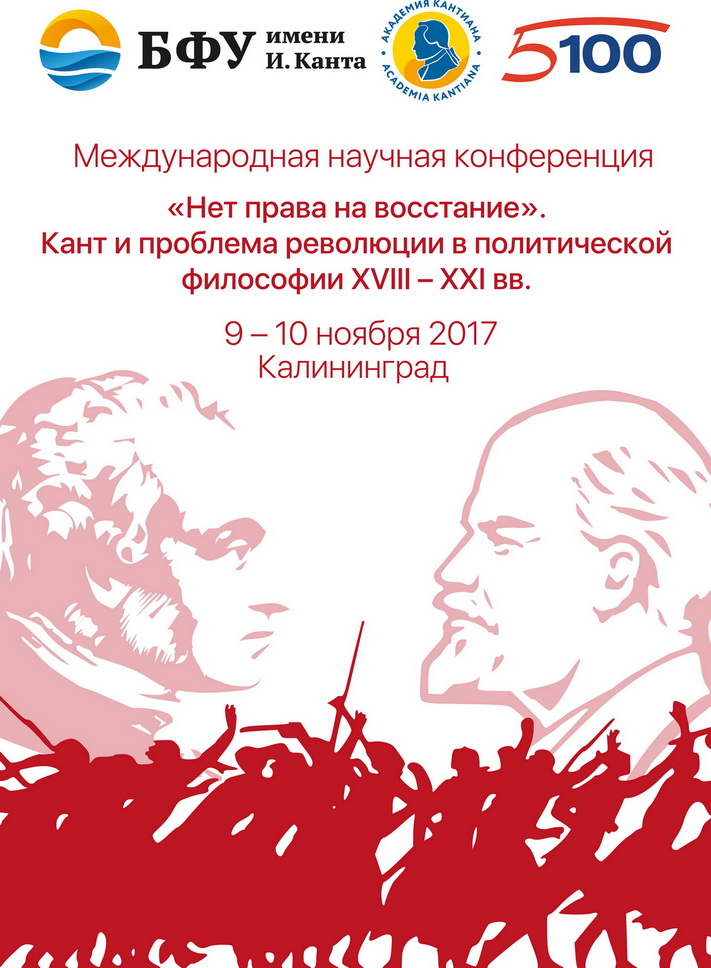 International Conference “„No Right of Sedition“ Kant and the Problem of Revolution in Political Philosophy from the 18th to the 21st Century”, 9th – 10th November 2017
International Conference “„No Right of Sedition“ Kant and the Problem of Revolution in Political Philosophy from the 18th to the 21st Century”, 9th – 10th November 2017
Academia Kantiana, Immanuel Kant Baltic Federal University, Kaliningrad, Russia
The 100th anniversary of the Russian Revolution in 2017 is attracting worldwide attention. Numerous studies and meetinges are devoting themselves to the history and the historical significance of this event. More than this, one can note an increased interest in the clarification of the concept of revolution and its meaning for the present day. In theoretical-historical reviews of the past, however, it was the French Revolution which engendered the decisive considerations pro and contra revolution. Immanuel Kant’s carefully differentiated reflections on the French Revolution and on revolution in general can be seen as a milestone in the philosophical analysis of the concept and the phenomenon of revolution. Kant’s differing assessments of the historical, legal and moral aspects of this revolution has exercised a decisive influence on the subsequent discussion up until the present day. In spite of the many variations in explanation, justification and critique of revolution, Kant remains in direct or indirect manner the factual point of reference.
The International Conference “No Right of Sedition”. Kant and the Problem of Revolution in Political Philosophy from the 18th to the 21st Century will attempt to throw light on the conceptual metamorphosis of the theory of revolution in political philosophy from Kant to the present day and on the influence of Kant’s standpoint and its actuality. Particular attention will be paid to the theories of revolution arised around the Russian Revolution from 1917.
Invited Speakers: Vadim Chaly (Kaliningrad, Russia), Giuseppe Cospito (Pavia, Italy), Antonino Falduto (Halle, Germany), Florian Grosser (Berkeley, USA), Heiner F. Klemme (Halle, Germany), Aleksey Kozyrev (Moskau, Russia), Tamas Krausz (Budapest, Hungary), Aleksey Krouglov (Moskau, Russia), Andrey Maidansky (Belgorod, Russia), Reidar Maliks (Oslo, Norway), Boris Mezhuev (Moskau, Russia), Petr Rezvykh (Moskau, Russia), Tatjana Rumyantseva (Minsk, Belarus), Andrey Teslya (Kaliningrad, Russia).
Organizing Committee: Nina Dmitrieva (Chair), Valentin Balanovsky (Deputy Chair), Vadim Chaly, Leonid Kornilaev, Sergey Lugovoy, Andrey Zilber.
Program
Venue: the Administrative building of the IKBFU, auditorium “Aquarium”
Thursday, November 9, 2017
09:00 – 09:30 – Registration
09:30 – 09:45 Opening ceremony:
Andrey Klemeshev, Rector
Tatyana Tsvigun, Director of the Institute for Humanities
Nina Dmitrieva, Scientific Director of the Academia Kantiana,
Professor of Moscow State Pedagogical University
Moderator: Heiner F. Klemme
09:45 – 10:45 Reidar Maliks (Oslo): Kant and eighteenth century theories of revolution
10:45 – 11:45 Vadim Chaly (Kaliningrad): Kant’s moral radicalism vs. Kant’s political conservatism: refrain not to revolt is right.
11:45 – 12:00 Coffee break
12:00 – 13:00 Аleksey Krouglov (Moscow): Kant as a German theoretician of the French revolution: the dogma origin in Marxist-Leninist Philosophy
13:00 – 14:00 Lunch
Moderator: Vadim Chaly
14:00 – 15:00 Antonino Falduto (Halle): Erhard, Fichte, and Schiller on the people’s right to a revolution
15:00 – 16:00 Petr Rezvykh (Moscow): Schelling and the revolution: the state as a means
16:00 – 16:15 Coffee break
16:15 – 17:15 Andrey Maidansky (Belgorod): Phenomenology of labour and the fury of revolution (about the idealism of Marx’s political theory)
17:15 – 18:15 Heiner F. Klemme (Halle): Carl Schmitt or Kant? An attempt on right, state and revolution
19:00 Dinner
Friday, November 10, 2017
Moderator: Valentin Balanovskiy
09:30 – 10:30 Aleksey Kozyrev (Moscow): Revolution and religion: the case of Russian intelligentsia
10:30 – 11:30 Andrey Teslya (Kaliningrad): Rosanov’s ‘revolution’ and ‘apocalypse’: Between a renewal and the end
11:30 – 11:45 Coffee break
11:45 – 12:45 Boris V. Mezhuev (Moscow): Late slavophilism and world revolution
12:45 – 14:00 Lunch
Moderator: Nina Dmitrieva
14:00 – 15:00 Tamás Krausz (Budapest): Lenin’s conceptualization of state, democracy and revolution
15:00 – 16:00 Tatyana Rumyantseva (Minsk): Aleksandr Bogdanov on the revolution in Russia and alternative paths to socialism
16:00 – 16:15 Coffee break
16:15 – 17:15 Giuseppe Cospito (Pavia): The issue of revolution in Gramsci (between Kant and Marx)
17:15 – 18:15 Florian Grosser (Berkeley): Kant on political change within the boundaries of reason: revolution, reform, and the ‘democracy-to-come’
18:15 – 18:30 Closing ceremony

